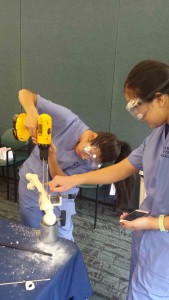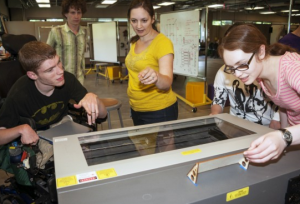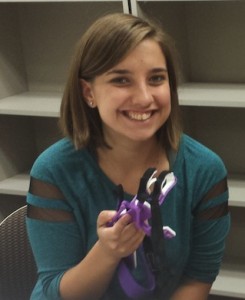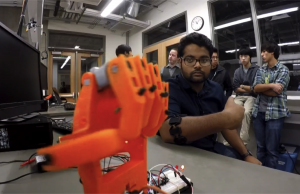Seattle Children’s Hospital hosted the Perry Initiative this weekend to inspire women to pursue careers in engineering and orthopaedic surgery. Dr. Jacquelin Perry was one of the first ten women orthopaedic surgeons in the country and has been a mentor to countless women and men throughout her career. She is known for her work quantifying human movement using tools such as motion analysis, electromyography, and ultrasound. She developed new surgical procedures including methods to straighten spines and inventing the ‘halo’ to immobilize the spine, neck, and head.
 This weekend, 25 women from local high schools, joined surgeons and engineers at Seattle Children’s to learn about common medical tasks and cutting-edge medical technology. They tried their hand at casting, suturing, external/internal bone
This weekend, 25 women from local high schools, joined surgeons and engineers at Seattle Children’s to learn about common medical tasks and cutting-edge medical technology. They tried their hand at casting, suturing, external/internal bone
fixation, and rotator cuff repair.
From the Perry Initiative: “Engineers and orthopaedic surgeons work hand-in-hand to develop safe and effective implants for repairing broken bones, torn ligaments, and worn-out joints. Strong partnerships between surgeons and engineers are essential for improving the performance of orthopaedic implants and creating solutions to unmet clinical needs.”
We agree! Here’s to many future collaborations with diverse teams of engineers and surgeons.
 great work on how toys can be easily hacked for individuals with disabilities from John Schimmel and Holly Cohen, cofounders of DIYAbility, .
great work on how toys can be easily hacked for individuals with disabilities from John Schimmel and Holly Cohen, cofounders of DIYAbility, .
 The Ability & Innovation Lab is excited to announce that two of our recent grant proposals have been funded! This funding will help to accelerate our mission to improve movement for individuals with neurologic disorders.
The Ability & Innovation Lab is excited to announce that two of our recent grant proposals have been funded! This funding will help to accelerate our mission to improve movement for individuals with neurologic disorders. This weekend, 25 women from local high schools, joined surgeons and engineers at Seattle Children’s to learn about common medical tasks and cutting-edge medical technology. They tried their hand at casting, suturing, external/internal bone
This weekend, 25 women from local high schools, joined surgeons and engineers at Seattle Children’s to learn about common medical tasks and cutting-edge medical technology. They tried their hand at casting, suturing, external/internal bone
 ongratulations to one of our collaborators, Ivan Owen from UW Bothell, for being selected as one of the top nominees for the
ongratulations to one of our collaborators, Ivan Owen from UW Bothell, for being selected as one of the top nominees for the